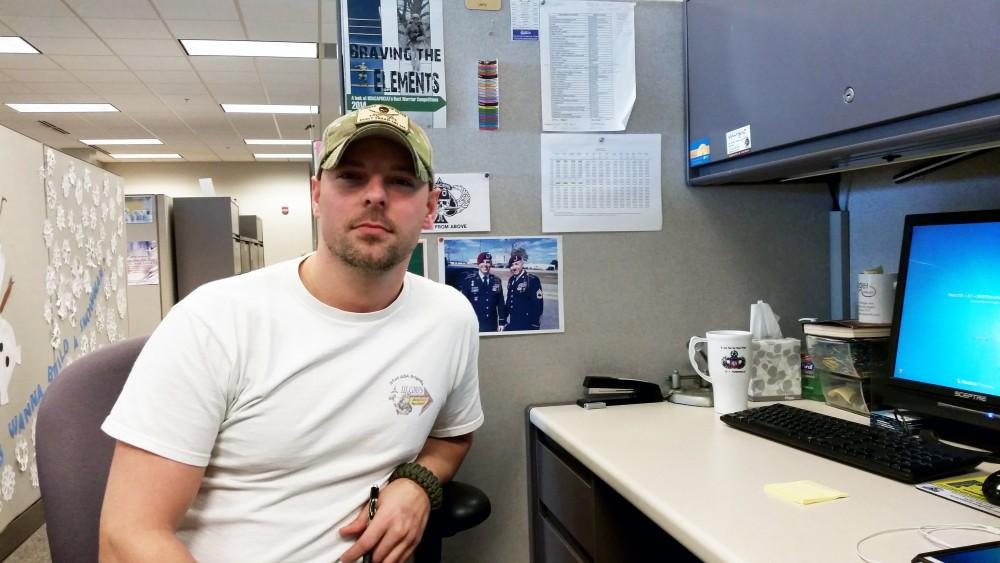Coping with change

GVL / Courtesy Keith Eichholz Larry James, 32, non-traditional student at GVSU
Feb 16, 2015
Since 2001, the U.S. has been rattled with unexpected blows. From Sept. 11 to nuclear threats posed by North Korea, America has endured many threats of change. America has seen itself involved in more than a decade of war.
But for Larry James, who has worked in the records office at Grand Valley State University for the last year and a half, all of those things are personal because he experienced them firsthand. James served as an active duty soldier in the Army for nine years before making his way to GVSU.
He now combs through files, making sure all the military veterans attending GVSU keep their information up to date and stay on track to graduate with the courses they schedule.
But in 2012, he was not pushing papers.
James was deployed for nine months to Afghanistan and served as an early-warning system operator, dealing primarily with helicopters. When forward observers called in for helicopter support or in any type of ballistic engagement, it was James’ job to make sure everybody was on the same page and that friendly fire among American troops was avoided.
“I coordinated fires between our actual gun bunnies or our fires guys, Air Force aviation and Army aviation,” James said. “I was the checks and balances; that way we weren’t shooting down friendly aircraft.”
James, 32, may be a nontraditional student now, but that wasn’t always the case.
James went to Ferris State University right out of high school in 2001 to major in visual design. James had signed up for the Marine Corps in response to the terrorist attacks of Sept. 11. Multiple untreated shoulder injuries sustained while playing high school football, however, put his military career on hold.
After surgery and a year of rehabilitation, he was finally fit for active duty.
While the Marine Corps was offering James the privilege of wearing the dress blues, the opportunity to earn free tuition by serving was the biggest draw for James. Turned off by the Marine Corps, James decided to join the Army.
On the eve of basic training in Fort Benning, Ga., James was about to taste more change than he had ever experienced.
“The guy who you show up as and the guy that you leave (as) are completely different,” James said.
James dedicated the rest of his training to benefit his country.
“When North Korea fired off all those test missiles into the ocean, they actually picked our unit to go to Okinawa, Japan to defend the 18th wing,” James said.
He didn’t have to endure life in the Army alone, however. James was married most of his military career to Deanna Adema, who he met at FSU.
“The military on your own sucks,” James said. “If you’re a soldier by yourself, you literally have two different routes to go and no outside forces to talk any sense into you.
“Either you end up with a good group of guys who are going to keep you out of major trouble and just get you into little trouble, or you’re going to end up hanging out with those knuckleheads who want to sneak into Mexico in the middle of the night.”
For James, his wife was his reminder.
“If you get a spouse or significant other, then you basically have that little voice in the back of your head that says, ‘You’re an idiot. This is a terrible idea. Come home,’” he said.
Life dealt James and his family another unforeseen circumstance when his son Braeden was diagnosed as mildly autistic.
“The rest of the kids would be coming up and showing Mom and Dad, ‘Hey, look! Look what I got!’” James said. “My son would be swinging a stick in the corner, playing by himself.”
James and his wife found out that Braeden more than likely had Asperger’s Syndrome, a condition that features high intelligence and narrow, sometimes obsessive interests but a lack of social skills.
With a divorce to his wife and the likelihood that the military would take him far away, James decided to leave the Army in order to have more influence on his son, who is now 6 years old.
James currently serves as a reservist with the 346th Psychological Operations Company based in Columbus, Ohio.
James cites two leaders that were instrumental in developing the character he has today: Sgt. Maj. Michael Kuppers and Sgt. Rachel Contreras.
James credits Kuppers and Contreras for his ability to lead privates and young soldiers, as well as to empathize with them.
“I was able to actually listen to what was going on with them,” James said. “And I found out, too, that I knew my soldiers a lot better, and they were more inclined to come up and talk to me.”
At the end of the day, helping out soldiers was what he loved most.
Now, James finds himself not in the deserts of Afghanistan, but on the snow-covered campus of GVSU. Change has not escaped him.
Though James is a nontraditional student, he can relate to his fellow students because he’s doing the same things they’re doing; from riding the bus to fighting the weather, he’s bearing it just like every other Laker.
James, who majors in advertising and public relations, hopes to someday be part of a television advertising team.
“I’d like to be able to use my creative side, apply my problem-solving skills and get paid for it,” James said.
Fortunately for James, he has found a carry-over from his time with psychological operations to advertising.
“It’s all about identifying your target audience and what you want to send to them,” James said.
James is still trying to persuade and influence human behavior, only now it’s not that of the enemy, but of consumers.

























